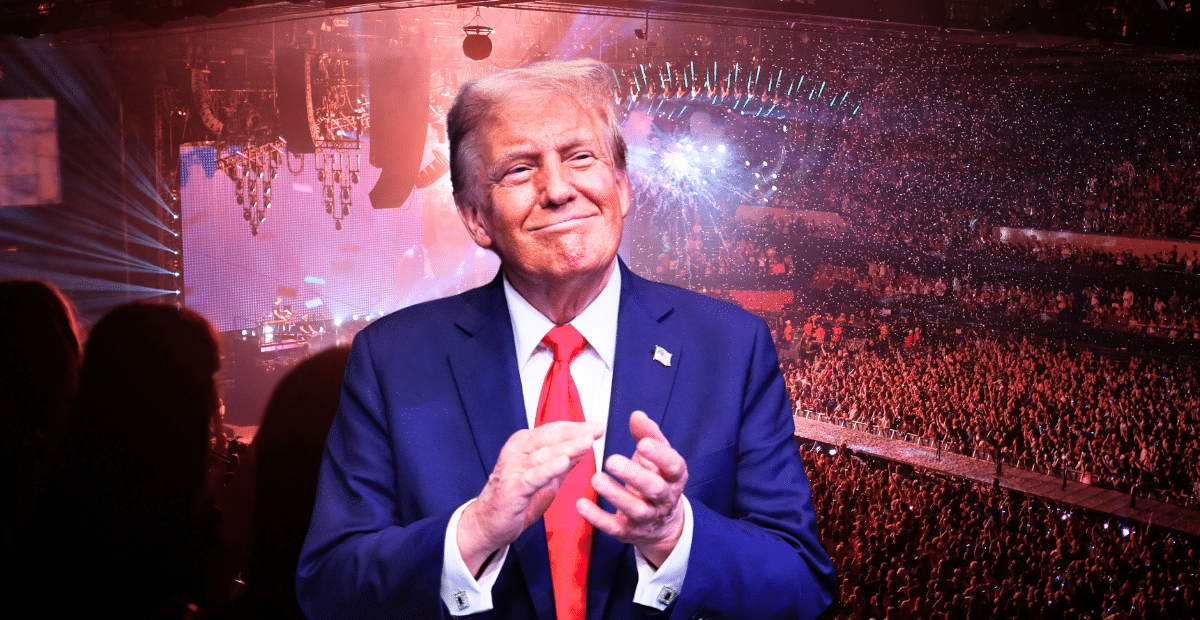
Live Nation Reportedly Proposes Trump Administration Institute 20% Cap On Ticket Resale Prices

On July 7, the Trump administration concluded a 60-day period of accepting public comments on ticket scalping. Live Nation reportedly submitted a packet to the DOJ and FTC by the deadline, recommending a 20% cap on ticket resale prices. (Photo credit: Chaz McGregor / Unsplash, and Jeff Bottari / Zuffa LLC / Getty Images)
DOJ And FTC Reviewing Reports On Ticket Scalping
Remember the episode of Seinfeld where George Costanza and Kramer have two extra tickets to the opera?
With each ticket having cost $100, Kramer proposes that they could resell them for $500 each — or a 400% price increase.
“Now, wait, isn’t scalping illegal?” George asks.
Kramer replies, “Oh, yeah.”
Ticket scalping, or the act of reselling a ticket with the aim of making a profit, is not illegal, but it is regulated.
Still, that regulation, and the enforcement of it, has left some live entertainment companies — namely, Live Nation — wanting.
The ticketing company’s concerns are now being shared with the Trump administration, even as Live Nation is the subject of an anti-trust lawsuit brought on by the Justice Department, in conjunction with 40 state and district attorneys general, “for monopolization and other unlawful conduct that thwarts competition in markets across the live entertainment industry.”
Live Nation’s Recommendations On Scalping
According to Variety, Live Nation has created a packet of data on the entertainment ticketing industry with the aim of this material being presented to the Trump administration.
Submitted to the Department of Justice on July 7, which was the last day of a 60-day window for public comments to be submitted to the DOJ and the Federal Trade Commission on the issue of ticket scalping.
“[Live Nation’s] submission, reviewed by Variety, is intended to address issues across the secondary ticket market and outlines suggested reforms to create fairness for fans and artists,” Variety reported on July 8.
Summarizing Live Nation’s suggested reforms, Variety wrote:
“Live Nation, the parent company of Ticketmaster, suggests that there should be 20% caps placed on ticket resale prices; that artists be given greater control over secondary ticket sales; and that the government should do more to combat bad actors, including going after deceptive websites and more effective enforcement of the 2016 BOTS Act.”
The proposed 20% cap is aligned with what President Donald Trump pointed to in a March 31 executive order, in which Trump said of ticket scalping, “By some reports, fans have paid as much as 70 times face value to obtain a ticket.”
From within Live Nation’s packet, Variety quotes the company, saying, “Many assume the system is rigged … This industry deserves a system that protects the artist-fan connection the way the artist meant it to be, not as corrupted by profiteering interlopers.”
The Trump Administration’s Approach To Scalping
On March 31, Trump issued an executive order regarding ticket scalping.
Noting that “America’s live concert and entertainment industry … has become blighted by unscrupulous middlemen who … impose egregious fees while providing minimal value,” the executive order seeks to make ticketing beneficial to both artists and fans.
The executive order states:
“Ticket scalpers use bots and other unfair means to acquire large quantities of face-value tickets and then re-sell them at an enormous markup on the secondary market, price-gouging consumers and depriving fans of the opportunity to see their favorite artists without incurring extraordinary expenses … When this occurs, the artists do not receive any profit. All profits go solely to the scalper and the ticketing agency.”
Trump’s order goes on to say, “My Administration is committed to making as accessible as possible the arts and entertainment that enrich Americans’ lives.”
From there, five actions were outlined for Trump’s administration to take:
- The DOJ and FTC are to “ensure that competition laws are appropriately enforced in the concert and entertainment industry, including where venues, ticketing agents, or combinations thereof operate to the detriment of artists and fans;”
- The FTC is to “rigorously enforce” the BOTS Act of 2016, which stands for Better Online Tickets Sales, and prohibits entities from circumventing security measures, accessing control systems, or other technological means of manipulating ticket access;
- The FTC is to propose, as needed, regulations to “ensure price transparency at all stages of the ticket-purchase process, including the secondary ticketing market;”
- The FTC is to “evaluate and, if appropriate, take enforcement action to prevent unfair, deceptive, and anti-competitive conduct in the secondary ticketing market;” and
- Secretary of the Treasury Scott Bessent and Attorney General Pam Bondi are to “ensure, as appropriate, that ticket scalpers are operating in full compliance with the Internal Revenue Code and other applicable law.”
The executive order states that Bessent, Bondi, and the FTC Chairman Andrew Ferguson are to submit a report within 180 days of the signing of the March 31 executive order, describing “the actions they have taken to implement this order” while also detailing “any recommendations for regulations or legislation necessary to protect consumers with respect to the live concert and entertainment industry.”
This report is expected to be submitted to the White House in late September.
Related: Kid Rock Joins Trump As He Signs Executive Order Aimed At “Exploitative Ticket Scalping”



